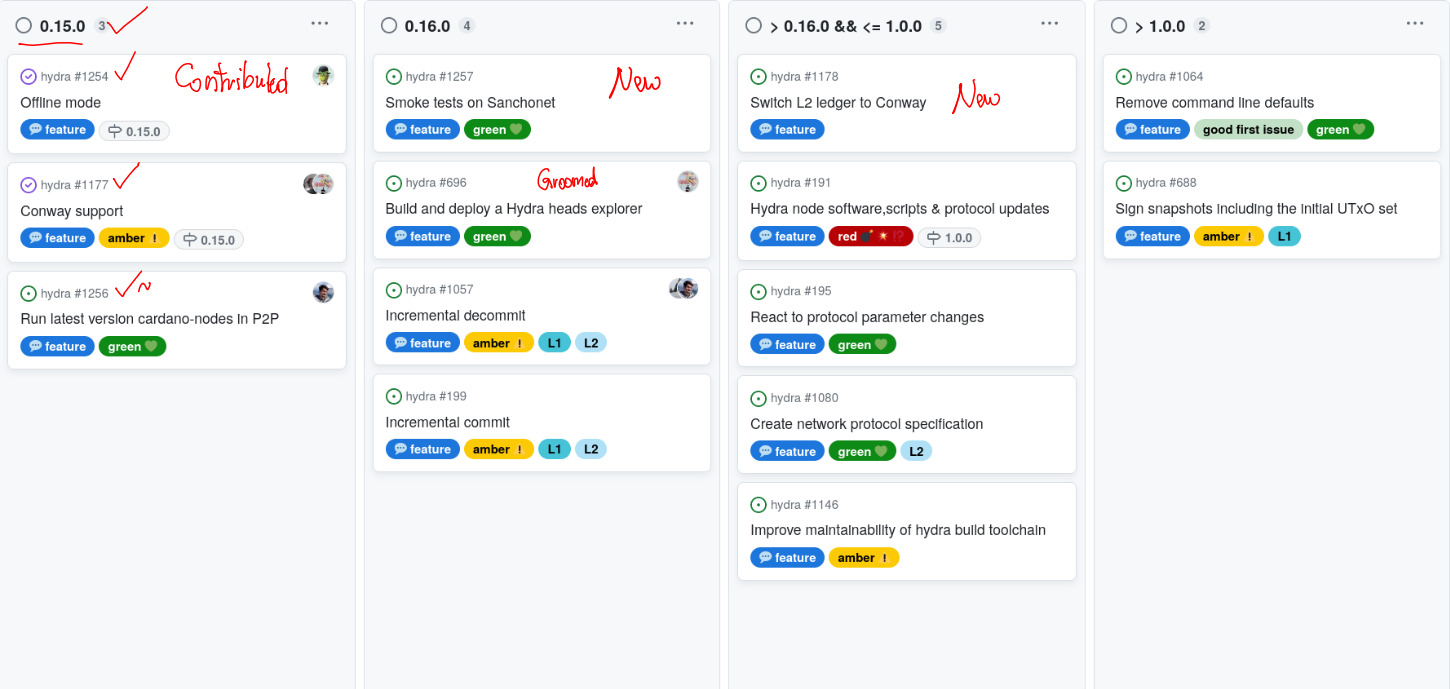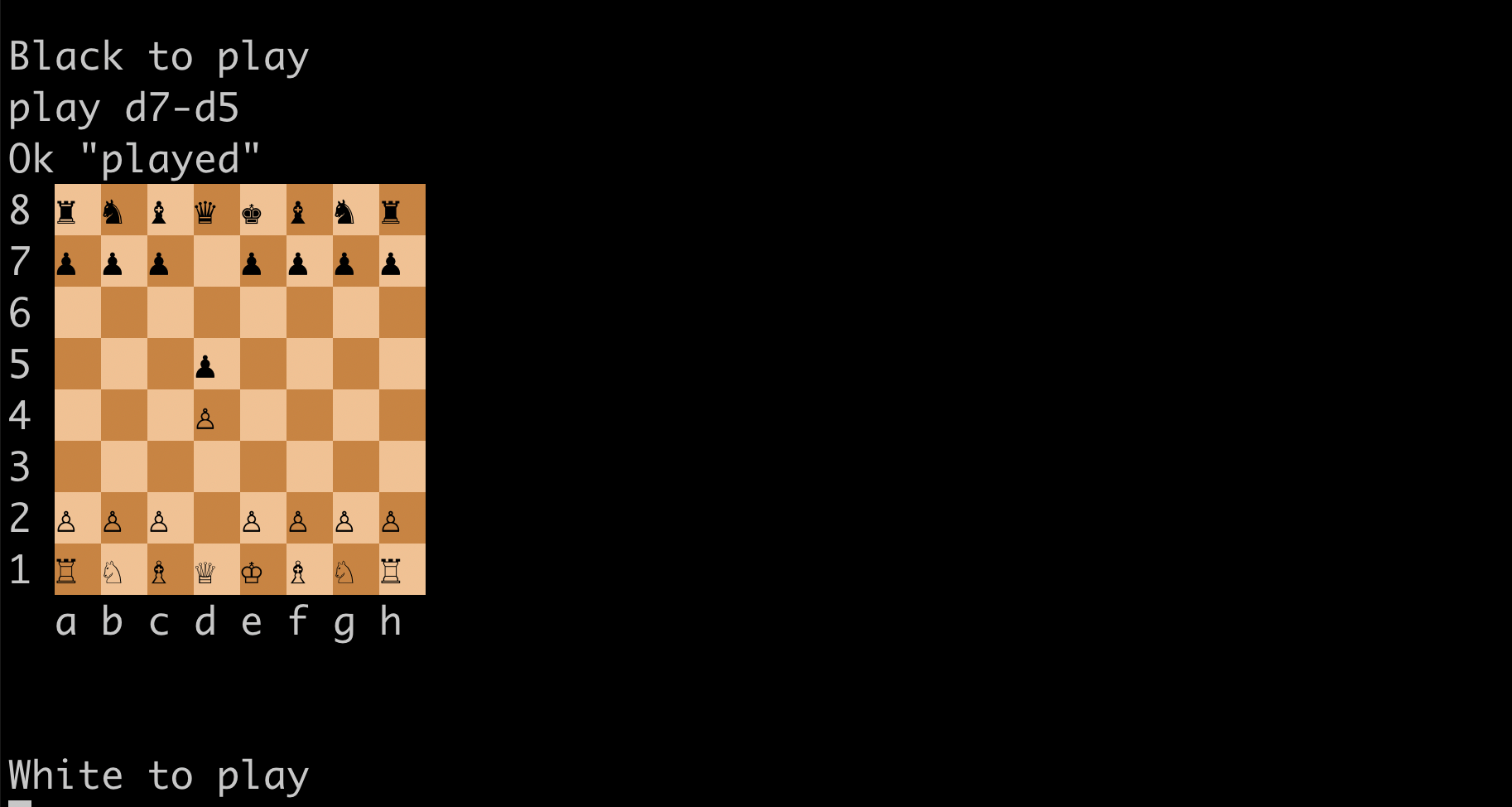This report summarizes the work on Hydra since November 2023. It serves as preparation for the monthly review meeting (see slides and recording), where the team updates project stakeholders on recent developments to gather their feedback on proposed plans.
Roadmap
The Hydra team restructured several items on the project roadmap this month.

Notable updates
-
Released version
0.15.0, delivering offline mode and Conway support. -
@SundaeLabs contributed a new feature, offline mode #1254, which is related to this Catalyst project.
-
Delivered Conway support #1177 preparing
hydra-nodefor the upcoming Conway hard fork. -
A new feature, indicating preparation for running the latest version of Cardano nodes in P2P #1256. This is necessary as IOG's non-P2P relay nodes are to be shut down in January 2024.
-
Similarly, a new feature - running smoke tests in SanchoNet #1257 - will serve as another proof point of being able to open/close heads in the new Conway era.
-
Groomed and started work on building and deploying a Hydra heads explorer #696, see details below.
-
Renamed 'Drop Babbage support #1178' to Switch layer 2 ledger to Conway #1178 to better capture its content.
Hydra development
Issues and pull requests closed since the last report.
This month, the team worked on the following:
API changes: dropping JSON Tx
The Hydra API now utilizes a TextEnvelope containing the upstream CBOR encoding from cardano-api for the Tx type and removes the JSON representation from the API #1240. This ensures that transaction types have a fixed canonical encoding that will not change between versions. As a result, consumers of the Hydra API will need to deserialize CBOR to inspect transactions.
This representation mirrors the TextEnvelope produced by the cardano-cli, with the addition of an txId field, which is guaranteed to match the transaction ID within the CBOR object.
We do not plan to go through a deprecation cycle on this breaking change to the API. If you are affected and see a problem updating your Hydra client to use CBOR, please open an issue on GitHub.
Hydra Chess
We team began developing a game on Hydra, leveraging dogfooding to uncover suboptimal elements or stumble upon bugs requiring resolution. Hydra Chess exemplified this process, offering valuable lessons during DApp development.

While refining the details, the team aims to improve the workflow of running hydra-node within a full peer-to-peer DApp framework. The objective is to ensure user-friendly accessibility while also providing an example for Hydra developers. You can access the source code here.
Hydra Explorer
To measure the progress and success of Hydra, we require tools that provide insights into its usage. For this, the team initiated work on #696, enabling anyone to track Hydra heads throughout their entire life cycle and observe the growth of the Hydra ecosystem.
In this initial phase, the team has implemented a basic backend service #1235 that can track all heads on-chain within a devnet network. This service establishes a baseline and utilizes the hydra-chain-observer package, exposing a REST API for querying and retrieving information about all observed heads and their current states.
Community update
TapTools recently published a summary of the project's progress over the last two months, which complements the updates provided above. Check it out here!
Besides the contributed offline mode mentioned above, Sundae Labs is also implementing a streaming API as designed in ADR29 in the course of this Catalyst project.
Also funded through Catalyst is a continuation of the Hydra auction project by Ikigai and MLabs. The Hydra team has not yet re-engaged in a regular exchange, but they expect to support the project with features as needed as they kick off this work.
As also pointed out in the review session, some of the team members have been involved in organizing the first Cardano Buidler Fest - happening on April 23-24 in Toulouse, France. This event will be a prime chance to connect with the people building (on) Cardano and inspire new ways of collaboration. At the time of publishing, tickets are already sold out, but we hope to see many Cardano builders there!
Conclusion
We held the monthly review meeting for January 2024 on 2024-01-19 via Google Meet, presenting these slides and this recording.
This month, the teams demonstrated various Hydra and Mithril features. Additionally, Juan Magán and his team from Modulo-P showcased a compelling demo on utilizing zero-knowledge cryptography in a Hydra head for a mastermind game. This work is a Catalyst Fund 10 accepted proposal.
Besides providing the usual status and roadmap updates on both Hydra and Mithril, several interested community members, including Tudor, joined the discussion to share their use case ideas. Tudor presented his proposal for supply chain tracking of Moldavian wine, which is currently running as a Catalyst proposal in Fund11. The proposal aims to leverage Hydra for CIP-68 NFT updates in a head, requiring wallet/app support. We also discussed a potential CIP to standardize asset access if held on layer 2 ledgers.
Charles provided feedback on considering Cardano block extensions as a potential core protocol change, enabling various proof systems and new consensus algorithms to support partner chains. We further emphasized collaborative efforts with the community to explore and develop the user space, determining which aspects could evolve into marketplaces and what should be integrated into core protocols. Processes like CIPs play a vital role in standardizing and facilitating technology transfer from the 'user space' to the 'kernel space'.
These discussions will inform the team's roadmapping sessions for the year, focusing not only on building essential features for the Hydra Head protocol but also on experimenting with new approaches to enhance Cardano's efficiency and accessibility.



